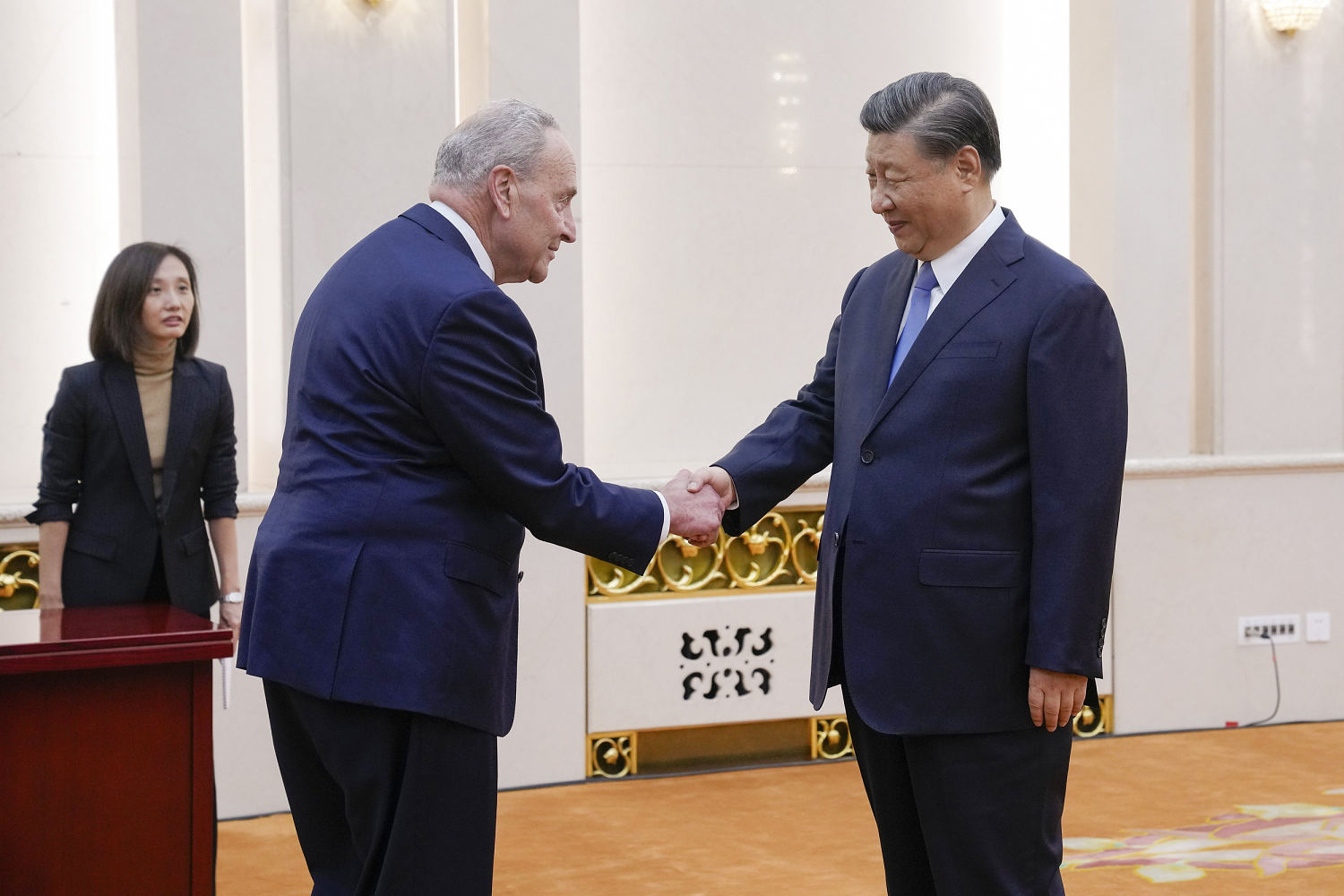
HONG KONG — A group of senators led by Senate Majority Leader Chuck Schumer, D.-N.Y., met with Chinese President Xi Jinping in Beijing on Monday, in a sign that Xi could hold a highly anticipated meeting with President Joe Biden later this fall.
The Chinese leader told Schumer that the U.S. and China have the most important bilateral relationship in the world and that their common interests outweigh their differences, state media reported. His comments came even as the outbreak of war between Israel and Hamas threatens to further strain ties that are already at their lowest point in decades.
The bipartisan group of six senators, which is also traveling to U.S. allies South Korea and Japan, is the first congressional delegation to China since 2019. They met with Xi at the Great Hall of the People in Beijing, according to state-run broadcaster CCTV.
Schumer described Xi as “engaged” during the meeting, which he said lasted much longer than expected at about 80 minutes.
During their meeting, Schumer said he was “disappointed” by what he described as China’s lack of “sympathy” for Israel after a surprise attack by fighters from the Palestinian militant group Hamas that was the deadliest incursion into Israeli territory in 50 years.
On Sunday, the Chinese Foreign Ministry urged “relevant parties” to immediately cease hostilities to protect civilians.
“The fundamental way out of the conflict lies in implementing the two-state solution and establishing an independent State of Palestine,” the ministry said in a statement that did not mention Hamas.
Speaking to Xi on Monday, Schumer described the events in Israel as “horrific.”
“I urge you and the Chinese people to stand with the Israeli people and condemn these cowardly and vicious attacks,” he said.
“I was very disappointed, to be honest, by the foreign ministry’s statement that showed no sympathy or support for Israel during these troubled times,” Schumer added.
Schumer delivered the same statement earlier Monday to Chinese Foreign Minister Wang Yi, who also attended the senators’ meeting with Xi.
At a news conference after the meeting, Schumer said the senators had also asked China to use its influence on Iran, which former U.S. intelligence and military officers say most likely played a significant role in the Hamas assault, to not allow the conflict to spread in the broader region.
Israel also criticized China’s response, saying it expected to see a “stronger condemnation” of Hamas.
Asked about Schumer’s remarks on Monday, the Chinese Foreign Ministry said it was “deeply saddened” by the civilian casualties and called for a cease-fire and negotiations, while reiterating support for a two-state solution.
“China is a common friend of Israel and Palestine,” spokesperson Mao Ning said at a regular news briefing in Beijing. “We sincerely hope to see Palestine and Israel co-existing peacefully and sharing security and development.”
Though Biden’s focus is likely to shift to the Middle East, a recent diplomatic blitz has raised hopes for a thaw in relations between the world’s two largest economies.
The most likely setting for a Biden-Xi meeting would be next month in San Francisco, which is hosting the Asia Pacific Economic Cooperation forum.
The leaders last met in Indonesia last November at the annual summit of the Group of 20 economies, an event Xi did not attend this year when it was held in India. They have not spoken since, even as U.S.-China relations have spiraled over trade, technology, the status of Taiwan, China’s stance on Russia’s war in Ukraine and the appearance of an alleged Chinese spy balloon over U.S. territory early this year.
Asked about a potential meeting with Xi, Biden told reporters on Friday that “there has been no such meeting set up, but it is a possibility.”
The senators had expressed hope for their own meeting with Xi before their trip to Asia, which they said was aimed at advancing U.S. economic and national security interests in the region. During their trip, which began in Shanghai on Saturday, they are meeting with government and business leaders as well as executives from American companies.
Schumer told Wang on Monday that China should provide a “level playing field” to American companies operating in the country, which have raised concerns about tightening regulations and an unpredictable business environment.
“We need reciprocity. That means that the American companies are able to compete as freely in China as Chinese companies are able to compete in America,” Schumer said at the news conference.
Wang urged Schumer to respect China’s core interests and right to development. Beijing has objected to U.S. measures aimed at cutting it off from advanced semiconductor chips as well as restrictions Biden ordered in August on U.S. investment in some high-tech industries in China that are considered strategically sensitive.
Schumer said while the U.S. should ensure that its trade policies are fair, it also must prioritize economic and national security, including protecting advanced technologies.
“Our delegation is clear that we do not seek a confrontation with China,” he said at the news conference. “But we will remain steadfast in our commitment to promoting stability in the region, freedom and democratic principles and vigorously defend our values.”
Though it was organized independently from the White House, the senators’ trip received expressions of support from the Biden administration, which sent a series of senior officials to Beijing over the summer in an effort to improve relations.
Senior U.S. officials, including members of Congress, would not typically meet with such a high-ranking Chinese figure as Xi. The Chinese president met with Secretary of State Antony Blinken in June but not other U.S. officials who made subsequent trips to Beijing, including Treasury Secretary Janet Yellen, U.S. climate envoy John Kerry and Commerce Secretary Gina Raimondo.
The other members of the congressional delegation are Sens. Mike Crapo, R-Idaho; Bill Cassidy, R-La.; Maggie Hassan, D-N.H.; John Kennedy, R-La.; and Jon Ossoff, D-Ga.